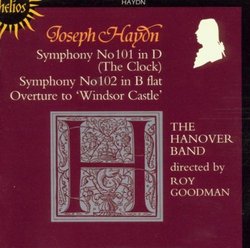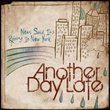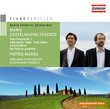| All Artists: Franz Joseph Haydn, Roy Goodman, Hanover Band Title: Joseph Haydn: Symphony No. 101 (The Clock); Symphony No. 102; Overture to "Windsor Castle" Members Wishing: 0 Total Copies: 0 Label: Hyperion UK Release Date: 10/14/2003 Album Type: Import, Original recording reissued Genre: Classical Styles: Forms & Genres, Theatrical, Incidental & Program Music, Historical Periods, Classical (c.1770-1830), Symphonies Number of Discs: 1 SwapaCD Credits: 1 UPC: 034571151274 |
Search - Franz Joseph Haydn, Roy Goodman, Hanover Band :: Joseph Haydn: Symphony No. 101 (The Clock); Symphony No. 102; Overture to "Windsor Castle"
 | Franz Joseph Haydn, Roy Goodman, Hanover Band Joseph Haydn: Symphony No. 101 (The Clock); Symphony No. 102; Overture to "Windsor Castle" Genre: Classical |
Larger Image |
CD DetailsSimilar CDs
|
CD ReviewsHaydn Would Be Pleased 10/21/2003 (5 out of 5 stars) "If you're jaded enough to wonder what all the fuss over Haydn was 210 years ago in London, Roy Goodman will certainly enlighten you. Despite the fact that Mozart's four last symphonies had achieved a breadth and depth of symphonic expression that was beyond anything the world had known (and of course London audiences would have been virtually in the dark about Mozart's achievement), Haydn's London Symphonies were bigger, brasher, bolder, more brilliant than the home-grown talents and German imports such as J. C. Bach and Karl Abel had ever hinted at. Even contemporary rivals such as Ignaz Pleyel were left for all times in the dust.Other authentic-instrument bands and leaders besides the Hanover Band under Goodman have helped to brush the cobwebs off these great but often mistreated symphonies, yet for me these performances catch all the joie de vivre and quicksilver wit on which Haydn thrives. As the notes to the recording say, at this point in his career, Haydn was writing proto-scherzos rather than minuets, so these minuets really zip along, maybe a little too fast for some, but it's a wonderfully wild ride. In the great movements here--the last movement of the 101 and the slow movement of 102, perhaps the greatest of their kind that Haydn wrote--proper balances and superb recording really tell. Brass, woodwind, and percussion scintillate as they should, while the strings provide poetry (102) or acrobatics (the wonderful fugal recapitulation of 101) as need be.(The nearest rival to Goodman in this respect is Charles Mackerras on a Telarc mid-price disc. Since he leads the Scottish Chamber Orchestra playing on modern instruments, his performance has a bit more suavity, which compensates nicely for any brio that is lacking. But little is, and if you want modern instruments, I heartily recommend Mackerras for Symphonies 100, 101, 103, and 104.)As I say, Hyperion's engineering certainly abets Goodman and Company's efforts. Those tremendous horns are placed in the left channel where their antiphony with the trumpets (at the right) can have full effect--I hate these producers who refuse to use the stereo effects God gave them to work with! Just listen to the marvelous brass cadence at the end of the "bonus," the Overture to "Windsor Castle." The sound stage for this recording is compact, as is the orchestra of course, but the ambience is quite lively nonetheless. Goodman leads the orchestra from the keyboard of a c. 1798 fortepiano, as Haydn did in his own concerts. Most modern-instrument performances and many period-instrument performances as well scrap the keyboard (except in the Symphony No. 98, where it has an important solo in the last movement). So is Goodman's adoption a gimmick? For answer, listen to the clever little dialog he has with the orchestra at the beginning of the development section in the first movement of Symphony 102. Elsewhere, Goodman's presence is tasteful and, I think, de rigueur finally.Do I have a criticism? Yes, even with the wonderful bonus overture, the CD gives short measure at only 52 minutes. But at mid-price, it's still a great bargain. If Haydn could hear these performances, I think he'd smile and say, "Yes, that's how I wanted it!"" Dazzling energy - Goodman/Hanover Band jeremy | 03/26/2008 (5 out of 5 stars) "My comments on all of these performances are essentially the same.
Roy Goodman and the Hanover Band team-up to create dazzling, energetic and witty performances of Haydn's works. I was so impressed I bought nearly all of the available set. The first movement of 101 is a delight, full of energy. I find myself dancing around the room! These works/performances are full of joy, fun and invention. They talk about Vivaldi, and Nigel Kennedy brings alive little known works in Vivaldi II. Goodman does the same thing. I emailed Roy Goodman to ask if any further recordings were available but alas the funding for the project ran-out. Nimbus released an earlier recording, with this pairing, of the London and Military symphonies, but they hadn't quite found the magic formula at that stage (1988). The sound balance is out and the performances are a bit clunky and disjointed. So stick with Helios anytime. Thank you Roy and The Band!" |



